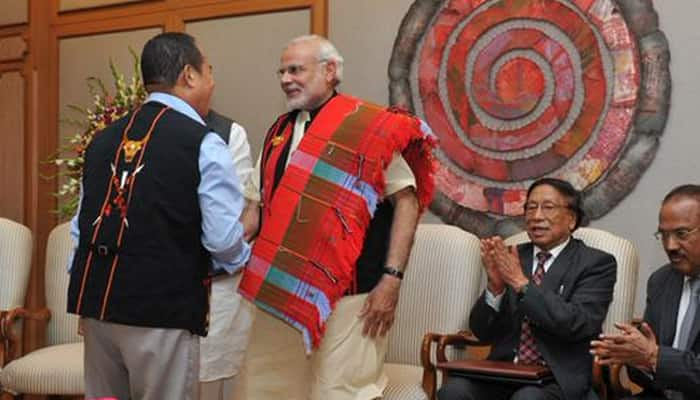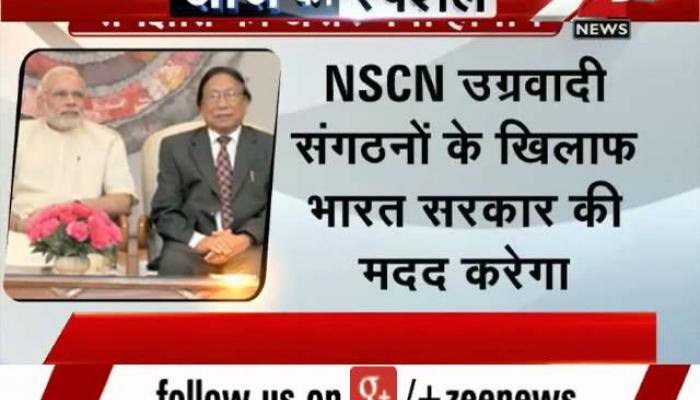New Delhi/Kohima: A day after the Central government and the National Socialist Council of Nagaland (Isak-Muivah) signed a historic peace deal to bring to end one of India's oldest insurgencies, Prime Minister Narendra Modi is likely to reveal the details of the accord in Parliament on Tuesday.
PM Modi had on Monday described the peace accord as 'historic', after witnessing its signing at his official 7, Race Course Road residence.
The deal has been welcomed by various stakeholders and aims to bring peace in the northeastern state ravaged by violence for over six decades.
As per unofficial reports, the NSCN(IM) has agreed to give up its demand for bringing together all Naga inhabited areas under one administration. The rebel group has also acknowledged the primacy of the Indian Constitution as part of the peace accord, reports added.
The Indian government, on the other hand, has accepted the uniqueness of the Naga history and culture and has agreed to grant Nagas living outside the state autonomy in governance.
Speaking after signing of the accord, PM Modi said yesterday that the agreement was an inspiration in "our troubled world", and not only marked the "end of a problem, but the beginning of a new future".
"Today's agreement is a shining example of what we can achieve when we deal with each other in a spirit of equality and respect, trust and confidence; when we seek to understand concerns and try to address aspirations; when we leave the path of dispute and take the high road of dialogue. It is a lesson and an inspiration in our troubled world," he said yesterday.
He said the Naga political issue had lingered for six decades, "taking a huge toll on generations of our people".
"It is a legacy of the British rule. The colonial rulers had, by design, kept the Nagas isolated and insulated. They propagated terrible myths about Nagas in the rest of the country," he said.
"The respect for the infirm and elders, the status of women in society, sensitivity to Mother Nature, and the emphasis on social equality is a natural way of Naga life. These are values that should constitute the foundation of the society that we all seek."
NSCN(IM) general secretary Thuingaleng Muivah, who signed the accord at the ceremony, hailed it as a "momentous occasion".
"Under Narendra Modi, we have come close to understanding each other and have worked out a new relation" with the government, he said, adding that the Naga people have great respect for Mahatma Gandhi.
Muivah, 81, is a key leader of the NSCN(IM) which has been in talks with the government since 1997 after a ceasefire agreement was signed.
NSCN(IM) chairman Isak Chishi Swu could not make it to the ceremony as he is unwell and undergoing treatment at Fortis Hospital in Delhi. His son Pasheto was, however, present.
While congratulating Modi, Nagaland Chief Minister TR Zeliang said: "This positive development will pave the way for a permanent solution acceptable to the Nagas."
"Our people have been struggling for more than six decades for a settlement to the Naga issue, and the signing of the peace accord is a welcome step towards such a settlement," he said.
The Naga Hoho, the apex body of all Naga tribes of Nagaland, welcomed the accord but said it needed to see the contents of the deal before further commenting on it.
"We are happy and welcome the accord but we need to see its contents before making further comments," Naga Hoho president P Chuba Ozukum said.
Asked how effective the deal would be given that it was signed with the NSCN(IM), while the NSCN(K) faction abrogated its ceasefire with the government in March this year, Ozukum said SS Khaplang was being asked to renew the ceasefire.
"We are still requesting Khaplang to renew the ceasefire. We are trying to make him understand," he said.
Naga People's Movement for Human Rights (NPHMR) chairman N Krome said they were all "caught by surprise by the sudden announcement".
The NSCN(IM), like several separatist groups in the Northeast, had been fighting for an independent, ethnic Naga homeland. It had been adamant on its demand for Greater Nagalim – integration of parts of Manipur, Arunachal Pradesh, Assam and areas of Myanmar where Naga tribes are in majority.
Nagaland became India's 16th state on December 1, 1963. The mostly mountainous state is spread over 16,579 square km and is home to 16 major tribes, each with distinct customs, language and dress. Christian-dominated Nagaland is home to around 20 million people. Its official language is English.
(With IANS inputs)
Also Read: Naga movement - A brief history and peace accord with the Indian government


















